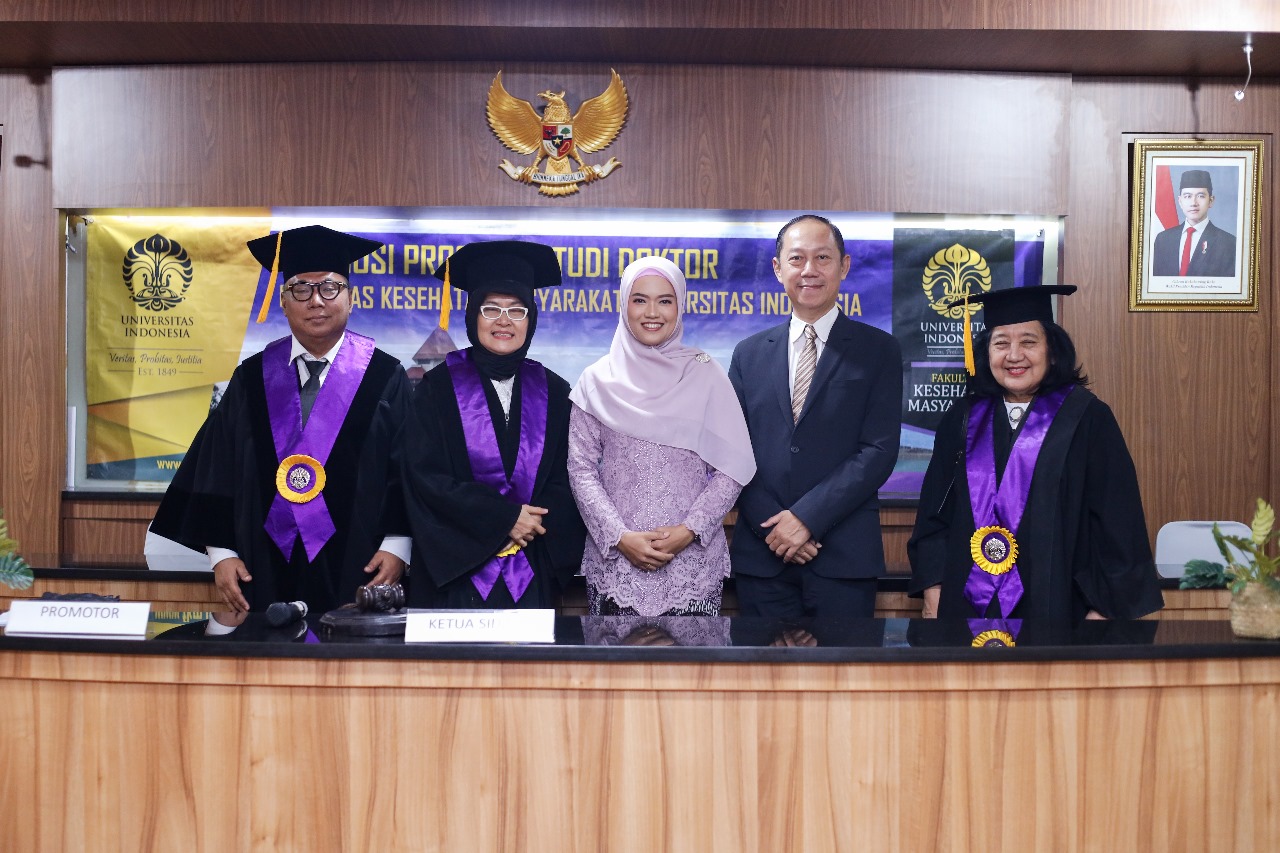On Saturday, June 28, 2025, the Faculty of Public Health (FPH) Universitas Indonesia (UI) held a public doctoral promotion session in Public Health Sciences, featuring doctoral candidate Mizna Sabilla. She defended her dissertation titled “A Predictive Model of Exclusive Breastfeeding Cessation at 0–12 Weeks Postpartum Using the Paternal and Maternal Breastfeeding Self-Efficacy Framework.” The session was chaired by Prof. Dr. drs. Sutanto Priyo Hastono, M.Kes., and attended in person by Promoter Prof. Dr. dra. Ratu Ayu Dewi Sartika, M.Sc., Apt., and Co-Promoter 1: Prof. dr. Endang L. Achadi, M.P.H., Dr.PH. Co-Promoter 2: Prof. Dr. Tria Astika Endah Permatasari, S.K.M., M.K.M., participated online. The examination board included Dr. Sri Redatin Retno Pudjiati, M.Si., Psychologist (Faculty of Psychology UI); Dr. Agus Triwinarti, S.K.M., M.Kes. (Ministry of Health); and Dr. Annisa Nurrachmawati (Indonesian Breastfeeding Mothers Association – AIMI).
Mizna Sabilla’s successful personal experience in exclusively breastfeeding her child with the full support of her husband inspired her to research the father’s role in the success of exclusive breastfeeding. Her dissertation presents an innovative approach by integrating both maternal and paternal breastfeeding self-efficacy in predicting the risk of early cessation of exclusive breastfeeding.
As a mother, Mizna recalled the challenging breastfeeding days—sore nipples, engorged breasts, fussy nights, and doubts about milk adequacy. However, her husband’s involvement in solving breastfeeding problems and offering emotional support became her greatest source of strength. “Biologically, breastfeeding is indeed a mother’s primary role, but that doesn’t mean fathers don’t play a part. Fathers are active partners and key companions for mothers,” Mizna emphasized.
A mother’s confidence in breastfeeding is referred to as Breastfeeding Self-Efficacy (BSE), while a father’s is called Paternal BSE. Studies show that fathers who lack support for exclusive breastfeeding often feel unprepared and incapable of assisting their wives, indicating low paternal self-efficacy. This observation deepened Mizna’s curiosity about fathers’ confidence in contributing to exclusive breastfeeding success in Indonesia, particularly in South Tangerang.
Her dissertation developed a predictive model incorporating psychological and social factors, such as prior breastfeeding experience, observational learning, verbal persuasion, emotional and physical conditions, and interactions between father and mother in decision-making. The model showed strong predictive power with an R-square value of 0.623. Maternal BSE was found to have the most direct influence on exclusive breastfeeding cessation, while Paternal BSE had the strongest indirect effect through maternal confidence.
Beyond analyzing the direct and indirect impacts on breastfeeding cessation, Mizna also developed a web-based screening application for both mothers and fathers to assess the risk of exclusive breastfeeding failure. This tool is intended for use by healthcare workers in facilities as well as by the general public. “By using this screening tool, we can predict whether mothers and fathers are at risk of failing to exclusively breastfeed, enabling targeted interventions by healthcare professionals,” Mizna explained.
Through her dissertation, Mizna contributed not only to academic knowledge but also to a broader vision of change. She expressed hope that in the future, exclusive breastfeeding would no longer be seen as solely a mother’s responsibility, but as a shared journey with fathers. “To all fathers, let’s support our partners during breastfeeding by offering practical help, information, financial support, and emotional care—just like my husband did, as a Prepared Husband and Breastfeeding Dad,” she concluded.
Based on her dissertation, Mizna was declared to have graduated with the title of Doctor in Public Health Sciences, achieving cum laude honors with a GPA of 3.92. She is the 16th doctoral graduate from the FPH UI Public Health Doctoral Program in 2025, the 355th from the program overall, and the 466th doctoral graduate of FPH UI. (promovendus)

